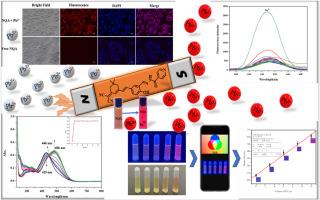用于特异性测定有毒 Pb2+ 离子的智能手机辅助显色和荧光双通道传感器的多方面应用
IF 2.1
3区 化学
Q2 CHEMISTRY, ORGANIC
引用次数: 0
摘要
以 Pb2+ 离子为代表的重金属污染物对人类健康和生态系统造成了严重危害,因此开发经济、便携的 Pb2+ 在线可视检测技术具有重要意义。在此,我们通过二氰异佛尔酮衍生物与异烟肼的希夫碱反应,制备了一种新型发色性和发荧光性双通道传感器 NQA,从而实现了对 Pb2+ 离子的有效检测。以 1:1 M 的比例与 Pb2+ 离子络合后,NQA 的荧光强度显著增强。利用 NQA 进行的肉眼比色检测显示,特定的 Pb2+ 离子浓度会产生从黄色到浅粉色的明显颜色变化。基于这一原理,我们开发了一种智能手机辅助传感平台,用于对实际样品中的 Pb2+ 进行高质量的肉眼识别。经测定,Pb2+ 离子的紫外结合常数为 1.84 × 105 M-1,检测限为 0.38 μM。此外,NQA 的多功能性还扩展到了裸眼试纸实验、真实水样和活细胞中 Pb2+ 离子的检测等方面的应用,展示了其在环境和生物监测方面的潜力。本文章由计算机程序翻译,如有差异,请以英文原文为准。

A smartphone-assisted chromogenic and fluorogenic dual-channel sensor for specific determination of toxic Pb2+ ions with multifaceted applications
Heavy metal pollutants, such as Pb2+ ions, pose a substantial hazard to human health and ecosystems, and it was of great significance to develop cost-effective and portable techniques for online and visual detection of Pb2+. Herein, we fabricated a novel chromogenic and fluorogenic dual-channel sensor NQA through a Schiff base reaction involving a dicyanoisophorone derivative and isoniazid, enabling effective detection of Pb2+ ions. Upon complexation with Pb2+ ions at a 1:1 M ratio, the fluorescence intensity of NQA exhibited a remarkable enhancement. The naked-eye colorimetric detection utilizing NQA demonstrated a distinct color change to specific Pb2+ ions concentration from yellow to light pink. Based on this principle, a smartphone-assisted sensing platform was developed for visual and high-quality identification of Pb2+ in real samples. The UV binding constant for Pb2+ ions was determined to be 1.84 × 105 M−1, with a detection limit of 0.38 μM. Furthermore, the versatility of NQA extended to applications in naked-eye test paper experiments, the detection of Pb2+ ions in real water samples and living cells, showcasing its potential for environmental and biological monitoring.
求助全文
通过发布文献求助,成功后即可免费获取论文全文。
去求助
来源期刊

Tetrahedron
化学-有机化学
CiteScore
3.90
自引率
4.80%
发文量
439
审稿时长
34 days
期刊介绍:
Tetrahedron publishes full accounts of research having outstanding significance in the broad field of organic chemistry and its related disciplines, such as organic materials and bio-organic chemistry.
Regular papers in Tetrahedron are expected to represent detailed accounts of an original study having substantially greater scope and details than that found in a communication, as published in Tetrahedron Letters.
Tetrahedron also publishes thematic collections of papers as special issues and ''Reports'', commissioned in-depth reviews providing a comprehensive overview of a research area.
 求助内容:
求助内容: 应助结果提醒方式:
应助结果提醒方式:


